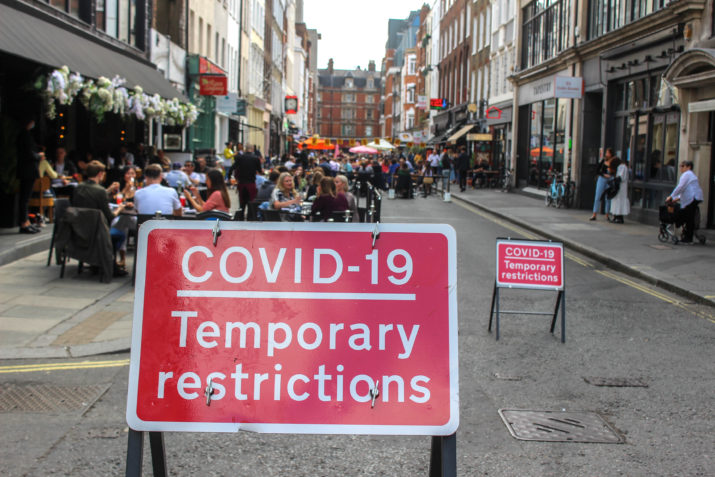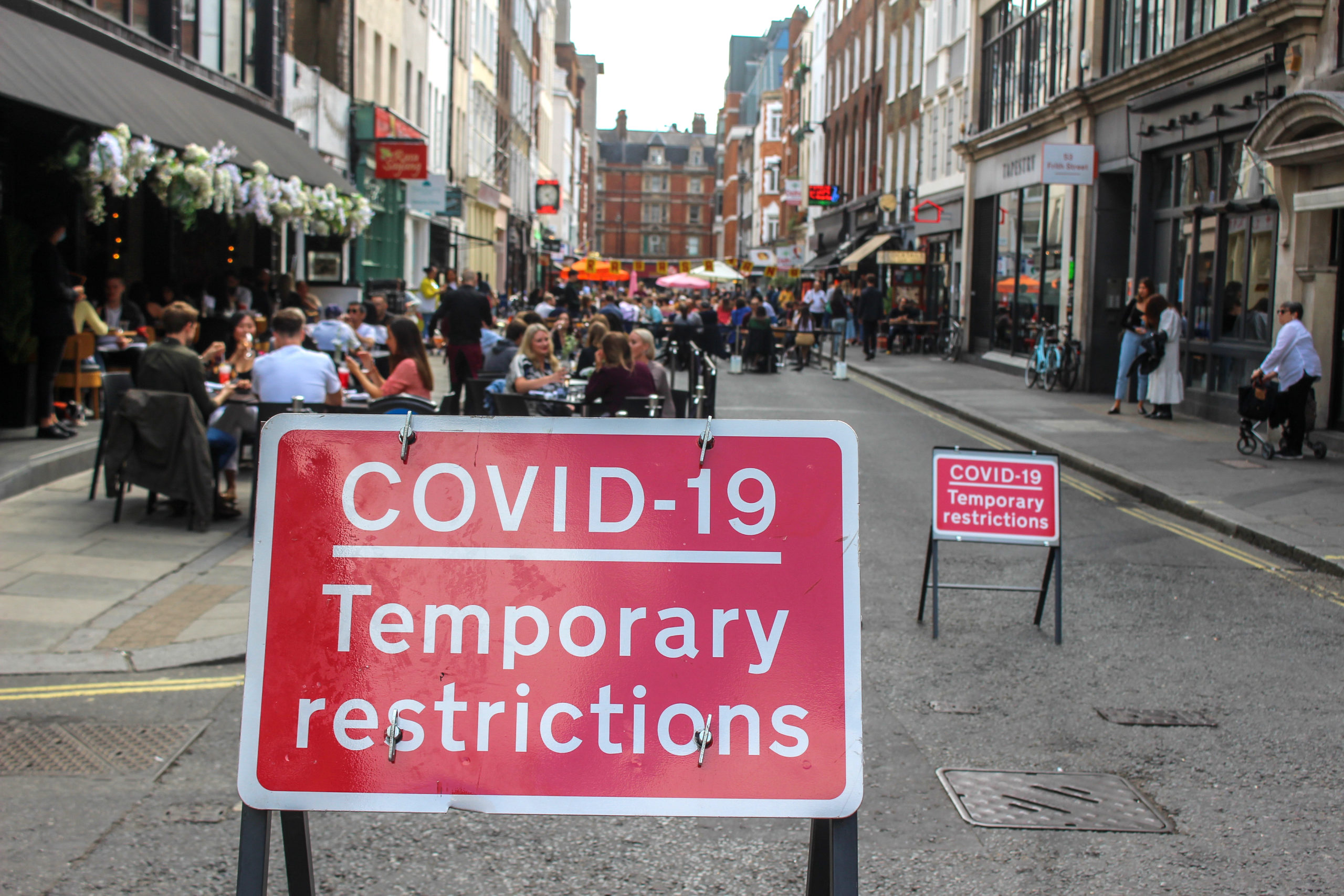

This is part of a series on the Novel Coronavirus (COVID-19) pandemic.
Europe’s ever-closer union began with the creation of the European Coal and Steel Community in 1955, which was followed by the creation of the European Economic Community (1957) and eventually the European Union. This union has prevented war, ensuring decades of peace, increased prosperity, and general comity. It is easy to say that, in 2021, the European Union is, in many ways, a singular international political, economic, and legal achievement, without parallel anywhere else. So, a degree of pride and hubris is to be expected and is certainly warranted. But, sometimes, this Brussels-based European esprit de corps results in huge blunders, as the Union seeks to inject itself into areas in which it has no competence, skillset, or track record. Unfortunately, the European response to the COVID-19 pandemic has shown this side of Europe at is worst, overreaching, underdelivering, and disappointing its population.
Sometimes the European route is the wrong one
In 2020, Europe’s leaders said that a centralized vaccine strategy would demonstrate the bloc’s capacity to unite, with EU President Ursula von der Leyen even calling the pandemic response “Europe’s moment.” While she was possibly right in terms of the additional 750bn euros of economic stimulus, ensuing events showed that she was wrong on the vaccine coordination and roll out. As Christopher Bickerton notes, the attempt “amounted to an enormous institutional experiment conducted amid a global health crisis. It was a breathtakingly reckless gamble that didn’t come off” (New York Times 2021). Instead of swift decisive coordinated action, we have seen a slow response, poorly coordinated policy, increasing finger pointing and deaths, and economic costs that might have in part been avoided if Europe had acted otherwise. Europe’s response to the COVID-19 pandemic, specifically its failure to deliver vaccines swiftly, is an example of European overreach and under delivery.
Europe should stay out of what it does not understand
Let us be clear. The European Union does not have responsibility for healthcare provision and delivery in its member states: It has never had that role. The system of healthcare is different in each member state, from Belgium, to Germany, or Spain, or Romania. The design and operation of health systems—and heath disaster responses—has always been a national prerogative and responsibility. Of course, when you travel across the EU you have a right to receive care, and this has been an innovative and positive development in the Union. But the EU never has been in the business or healthcare delivery. While coordination is good, trying to build something out of nothing in the middle of a disaster is a mistake. For the EU to thrust itself into the coordination of the pandemic response and oversee vaccine purchase and provision was a bad idea. In the heat of a medical emergency, its claiming responsibility over an area where it had no expertise or skills was bound to lead to problems, and it did.
Taking huge risks is not what the EU does well
When the pandemic began to spread in late 2019 and early 2020, speed and decisiveness was especially essential in one area: Vaccine production and contracts. Vast commitments of resources were needed to accelerate vaccine design, production, and roll-out. Contracts had to be signed even though it was unclear which vaccine would work best—or at all. For when a crisis of this magnitude strikes, it is often necessary to overspend and deal with mistakes later, as the safety and health of the population must trump procurement norms and procedures. The UK and US understood this. Both Donald Trump and Boris Johnson signed large contracts with vaccine producers early on, often even before the efficacy of a specific vaccine was knowable. Recall that in the spring of 2020, the precise timetable for vaccine design and production stretched for months, even years well into 2021 and 2022. Very few experts thought it would be possible to dispense vaccines by the end of 2020, let alone widely by this spring. US and UK leaders (as well as Israeli leaders) took the risk of large losses to over commit to production. In doing so, they gambled on a faster exit once the vaccines were produced. They made the right bet.
The European response was slow and bureaucratic
Once the EU had claimed vaccine coordination as its responsibility, it underperformed and underdelivered. High-ranking EU civil servants were unable to sign large contracts for vaccine production as they were constrained by procurement rules. Moreover, EU officials could not ink deals for vaccines, for which the efficacy was not confirmed. This would be an understandable scenario in normal times as it stop misappropriation or self-dealing. But, as it turns out, these EU rules did not work well in extremis, when rules had to be bent or broken to ensure success, where vaccine production must have been supported, and deals struck, even when it could be more expensive than normal. In contrast, in the context of a national government, rules can more easily be set aside, and risks taken and shouldered, when a crisis strikes. Not so in Brussels. As a result of the EU’s internal constraints, the EU Commission was less aggressive that the US or the UK in signing COVID-19 vaccine contracts in 2020 and the budget allocated to them was meager: For a population of 447 million, the EU had at its disposal a measly 2.7 billion euros (Barnelou 2021). In contrast, Britain opened its wallet, spending €4.3 billion, or $5.2 billion, to vaccinate a population of just over 66 million (Reuters 2020). The result is, that as of June 27 83.4 percent of the population aged 18 and over and more than 6 in 10 individuals aged 18 and over have been vaccinated with both doses (UK Government 2021). The US went even further, sparing no expense as it took a very aggressive stance and spent in excess of $10 billion on seven different vaccines (Weintraub and Weise 2020). The US made huge advance purchases, amounting to enough vaccine doses to vaccinate its population three times over. In 2021, President Biden added to Donald Trump’s purchases, and used wartime executive powers to force collaboration across companies and the pace of production. As of July 1, 2021, 67 percent have received at least one dose, and 58 percent of those 18 or older are fully vaccinated. The country is reopening, cases are in decline, and the economy bounced back and grew by over 6 percent in the last quarter.
In a pandemic saving money should not be the aim
On its own terms, the EU’s negotiations with the drug companies appeared successful: The EU paid less than the United States for its doses of Pfizer and AstraZeneca. But this misplaced frugality came at a price (Birnbaum, Roland, and Aries 2020). This tight-fisted budgetary approach meant that the EU was not at the front of the line when production ramped up, demand surged, and populations got hit with second, third, and perhaps soon (god forbid) fourth and fifth surges. We know now that the first contracts signed by the EU were not watertight. While the UK and US got first access to vaccine supplies, the European Union was under supplied, even when it held contracts, which showed to be poorly drafted and failed to ensure access. So, the EU underpaid, got poorer contracts, had to threaten litigation to access somewhat limited supplies of vaccines, continued periodic lockdowns, and faced an angry and disappointed populace.
However, it is never too late to place big orders. On May 8, 2021 the EU shifted its approach and made two huge forward purchases of vaccines. The Commission inked a deal with Pfizer/BioNTech for 900 million doses with an option for an additional 900 million to be delivered up until 2023 (Clinical Trials Arena 2021). The EU further signaled that other contracts and other vaccine technologies would follow, including with Moderna, Johnson & Johnson, and AstraZeneca. EU officials have belatedly recognized that certainty of excess supply is needed, not parsimony nor delay. This change may help shift the public’s mood. At least that is what European officials hope: that as vaccine rates rise, further antagonism and upset over earlier failures will fade and enthusiasm as opening gets under way will instead predominate. The European Union is now closing the gap with the US and UK on vaccination rates. As of July 1, 61 percent of those 18 and older had one vaccination, and 39 percent had received two doses (ECDC 2021).
Perception and reality
Some of the public disappointment with the EU early response may be perception rather than reality. In fact, the rate of vaccination is comparatively high in the EU, far above that in most countries (except the UK and Israel). Many countries are still in a continuing nightmare. The scenes in India, where the response was bungled, or South Africa and Brazil, with almost no vaccines, are horrific. In July 2021, the EU, US, and UK remain the global leaders in vaccination rates. Yet, public discontent rumbles on. Perhaps this is a problem of perception. When others appear to be getting greater vaccine access (say in the US or in Israel), it causes anger and annoyance, which is understandable given people have been in lockdown for more than a year, millions are dead, and many economies are still semi-somnolent. Voters want out of the lockdown, and some are blaming the EU for their predicament. For example, a March poll showed that 51 percent of Germans believe the EU has handled the COVID-19 rollout badly. This discontent was shared by 35 percent of French and 24 percent of Swedish respondents (DW.com 2021). Increasing numbers of Europeans want an end to lockdowns, which can only come as vaccination rates and access continue to climb in Europe. But what about the longer-term effects of the slow EU’s COVID-19 vaccine rollout?
The longer-term cost of pandemic fallout
The various costs to Europe of the perceived pandemic failure could be lasting. First, there is the healthcare cost. Although improving, the vaccine rollout has been sub-par and the cost has been real in lives lost, in hospitalizations, and in the many people with long COVID-19 symptoms. Just how many lives have been lost and permanently scarred through poor EU policy decisions, we cannot judge. But the public’s memory of failure, regardless of relative performance against the rest of the world, may linger.
Second, the economic costs are a stark reminder that in a pandemic, leaders must do whatever needed to arrest the pandemic, treat it, and vanquish it. Only then can the economy be restarted. It is obvious today that the search for cheaper and smaller-scale vaccine contracts―that were moreover, poorly drafted―was perhaps unwise. For European states’ economies can only restart with widespread vaccination. In July 2021, many of Europe’s economies limp on and the continent is recovering only slowly , while the US and Chinese economies bounce back. It may take some years for the European Union to make up the economic ground lost.
Third, both the European Union and national leaders’ political support may be adversely affected by the pandemic vaccine fallout. On the one hand, the European Union can be portrayed by nationalist parties and populists as having failed to ensure rapid vaccination. The COVID-19 story can in this manner become one more instance of Europe’s weakness. Relatedly, nationalists can use Europe’s perceived poor performance to try and boost their standing and make up ground against weakened mainstream politicians who by-and-large backed the European response. Take Emmanuel Macron. Macron initially got a boost from his handling of the crisis in 2020. But as the pandemic wore on, this support waned and a majority turned negative. In 2021, France’s third lockdown was quite unpopular, contributing to Macron’s approval rate declining in polling numbers Macron’s travails in 2021 are not European “faults.” But a weakened centrist French leader will be less able to support European solutions—and less likely to—in the future.
Consider a parallel universe in which Macron had struck early large national vaccine deals whatever the cost in 2020, after which he rolled out a more rapid response and vaccinations early this year, along the lines of what took place in the UK. Would Macron perhaps now be standing astride France, much as Johnson does Britain today? I think the answer is yes. Macron is not alone, as other European leaders are also struggling with the fallout from the pandemic. Others too may pay an electoral price. All European Union leaders perhaps need to heed two overarching lessons from recent events: Under promise and over deliver. Focus on doing what they do well, not what they dream they can do.
Federal devolution to the national and regional levels works
Europe is not the solution to every problem that ails European. Such erroneous notions can drive Europe to the wrong solutions for the difficulties at hand. Instead, European institutions should focus on what Europe can deliver, not what its leaders dream it should be capable of delivering. In other words, leaders should under promise and over deliver. In the US, Joe Biden has been practicing this policy mantra and it has worked well – the public response has been very supportive after the nightmare of Trumpism. Perhaps President Biden can teach Europe’s remaining center-left leaders a thing or two?
National or supranational coordination has an important role to play but it cannot substitute for local leadership, commitment, and direction, nor should it. In many cases, national authorities and systems are simply better at delivering outcomes. The early 2020 COVID-19 response in Germany comes to mind. Indeed, German regional health systems paired with clear national messaging held down transmission rates. It should not surprise that local authorities are better able to respond quickly and secure public support and buy-in. Policymakers should remember this next time Europe’s leaders suggest they should step into a breach where they have no track record.
Stuart P.M. Mackintosh is Executive Director of the Group of Thirty, and international financial think tank. His new book, Climate Crisis Economics (Routledge, 2021), will be published in September.
References
Barnelou, Lies. 2021. “Vaccins contre le Covid-19 : dans les coulisses des contrats entre l’UE et les groupes pharmaceutiques. ” Le Monde. February 3. https://www.lemonde.fr/planete/article/2021/02/03/vaccins-contre-le-covid-19-dans-les-coulisses-des-contrats-europeens_6068574_3244.html (accessed May 17, 2021).
Bickerton, Chris. 2021. ‘Europe Failed Miserably With Vaccines. Of Course It Did.’ New York Times. May 17. https://www.nytimes.com/2021/05/17/opinion/europe-vaccines-commission.html?action=click&module=Opinion&pgtype=Homepage (accessed May 17, 2021)
Birnbaum, Michael., Roland, Christopher., and Aries, Quentin. 2020. ‘Europe is paying less than U.S. for many coronavirus vaccines.’ Washington Post. December 18. https://www.washingtonpost.com/world/eu-coronavirus-vaccines-cheaper-than-united-states/2020/12/18/06677e34-4139-11eb-b58b-1623f6267960_story.html (accessed May 17, 2021).
Center of Disease Control. 2021. ‘COVID-19 Vaccinations in the United States’. https://covid.cdc.gov/covid-data-tracker/#vaccinations (Accessed May 17, 2021).
Clinical Trials Arena. .2021. ‘Pfizer/BioNTech’s Covid-19 vaccine mega deal ousts AstraZeneca from EU; Moderna, J&J best positioned for more preorders.’ May 17. https://www.clinicaltrialsarena.com/comment/pfizer-biontechs-covid-19-vaccine-mega-deal-ousts-astrazeneca-from-eu/ (Accessed May 18, 2021).
DW.com. 2021. ‘Germans unhappy with EU’s handling of vaccine scheme.’ March 3. [Online]. Available at: https://www.dw.com/en/germans-unhappy-with-eus-handling-of-vaccine-scheme/a-56756339 (accessed May 18, 2021).
ECDC. 2021. ‘European Center for Disease Prevention and Control – Covid19 Vaccine Tracker.’. July 1.https://vaccinetracker.ecdc.europa.eu/public/extensions/COVID-19/vaccine-tracker.html#uptake-tab (accessed July 1, 2021).
Reuters. 2020. ‘Britain to spend £3.7 billion on vaccines and bear liability, watchdog says.’ December 15. [Online]. Available at: https://www.reuters.com/article/uk-health-coronavirus-britain-vaccines-idUSKBN28Q014 (accessed May 17, 2021).
UK Government. 2021. Corona Virus Data. https://www.england.nhs.uk/statistics/wp-content/uploads/sites/2/2021/07/COVID-19-weekly-announced-vaccinations-01-July-2021.pdf (accessed July 1, 2021).
Weintraub, Karen., and Weise, Elizabeth. 2020. ‘Federal spending on COVID-19 vaccine candidates tops $9 billion, spread among 7 companies.’ USA Today. August 8. httpscountry/https://www.usatoday.com/story/news/health/2020/08/08/feds-spending-more-than-9-billion-covid-19-vaccine-candidates/5575206002/ (accessed May 17, 2021).
Photo: London / UK – 13 September 2020: ‘COVID-19 Temporary Restrictions’ roadsigns on Old Compton Street, Soho during London’s coronavirus pandemic | Shutterstock




